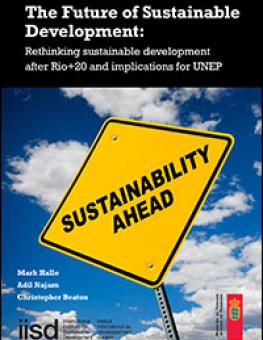
The Future of Sustainable Development: Rethinking sustainable development after Rio+20 and implications for UNEP
The United Nations Conference on Sustainable Development (UNCSD) in June 2012—commonly referred to as Rio+20—left many perplexed. If a number of advances were made, the results fell well short of what is needed to redirect the global economy onto a sustainable course.
Given that 20 years have passed since the Earth Summit, and 25 since the Brundtland Commission launched the notion of "sustainable development," clearly something is not working.
It is time for the sustainable development community to ask itself some tough questions: Why is sustainable development not "selling"? How might we re-envision the concept for the world of today? And what does this imply for organizations like the United Nations Environment Programme (UNEP), whose mission both contributes to, and depends on, the realization of sustainable development?
To explore these questions, the International Institute for Sustainable Development (IISD) organized an informal meeting in Abu Dhabi on December 2-3, 2012, with a handpicked selection of leaders and experts from around the world. The participants came from a wide variety of backgrounds, including present and former ministers of environment and development, senior UN officials, corporate CEOs, senior academics and leaders of major civil society organizations. The executive director of UNEP, Achim Steiner, played an active part in the discussions and was accompanied by staff from his Executive Office. The discussions were moderated by Simon Zadek, a senior fellow at IISD, and held under the Chatham House rule.
This paper draws heavily on ideas that were raised during the meeting, to offer a vision of how sustainable development might best be pursued in a post-Rio+20 world. In the first part, it proposes strategic ideas on how sustainable development in general might more effectively be catalyzed. In the second, it considers how UNEP in particular might best respond to the post-Rio+20 world. It is the perspective and the responsibility of the authors, representing their reflections on the discussion and their attempt to distil the lessons they learned. It has not been approved by the participants and may or may not fairly reflect their views. IISD is immensely grateful to all who participated for triggering and nurturing such a range of stimulating ideas and suggestions.
Participating experts
You might also be interested in
December 2024 | Carbon Minefields Oil and Gas Exploration Monitor
In November 2024, 23 oil and gas exploration licences were awarded across five countries, with Russia granting the licences that account for the largest portion of embodied emissions.
Sustainable Asset Valuation (SAVi) of a Small-Scale Tree Planting Initiative in Côte d'Ivoire
This report analyzes the social, economic, and environmental outcomes of a small-scale tree planting initiative at schools in Côte d'Ivoire.
The Cost of Fossil Fuel Reliance
Government support for fossil fuels reached at least USD 1.5 trillion in 2023, new data shows.
Increased Support Needed to Achieve India's Clean Energy Goals
India is on track to achieve many of its 2030 clean energy goals but needs to step up government support measures to accelerate the deployment of offshore wind, electric vehicles, and green hydrogen, according to a new report.